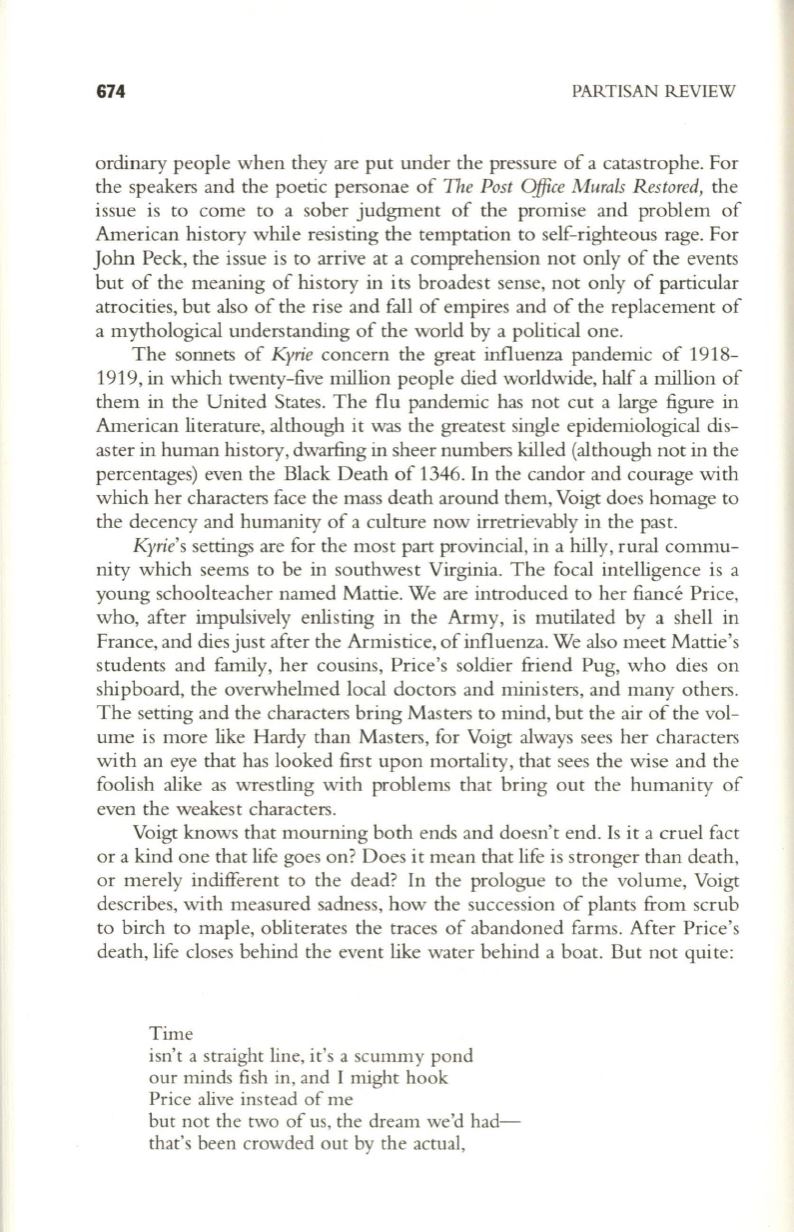
674
PARTISAN REVIEW
ordinary people when they are put under the pressure of a catastrophe. For
the speakers and the poetic personae of
The Post Office Murals Restored,
the
issue is to come to a sober judgment of the promise and problem of
American history while resisting the temptation to self-righteous rage. For
John Peck, the issue is to arrive at a comprehension not only of the events
but of the meaning of history in its broadest sense, not only of particular
atrocities, but also of the rise and fall of empires and of the replacement of
a mythological understanding of the world by a political one.
The sonnets of
Kyrie
concern the great influenza pandemic of 1918-
1919, in which twenty-five million people died worldwide, half a million of
them
in
the United States. The flu pandemic has not cut a large figure in
American literature, although it was the greatest single epidemiological dis–
aster in human history, dwarfing
in
sheer numbers killed (although not
in
the
percentages) even the Black Death of 1346. In the candor and courage with
which her characters face the mass death around them, Voigt does homage to
the decency and humanity of a culture now irretrievably in the past.
Kyrie's
settings are for the most part provincial, in a hilly, rural commu–
nity which seems to be in southwest Virginia. The focal intelligence is a
young schoolteacher named Mattie. We are introduced to her fiance Price,
who, after impulsively enlisting in the Army, is mutilated by a shell in
France, and dies just after the Armistice, of influenza. We also meet Mattie's
students and family, her cousins, Price's soldier friend Pug, who dies on
shipboard, the overwhelmed local doctors and ministers, and many others.
The setting and the characters bring Masters to mind, but the air of the vol–
ume is more like Hardy than Masters, for Voigt always sees her characters
with an eye that has looked first upon mortality, that sees the wise and the
foolish alike as wrestling with problems that bring out the humanity of
even the weakest characters.
Voigt knows that mourning both ends and doesn't end. Is it a cruel fact
or a kind one that life goes on? Does it mean that life is stronger than death,
or merely indifferent to the dead? In the prologue to the volume, Voigt
describes , with measured sadness, how the succession of plants from scrub
to birch to maple, obliterates the traces of abandoned farms. After Price's
death, life closes behind the event like water behind a boat. But not quite:
Time
isn't a straight line, it's a scummy pond
our minds fish in, and I might hook
Price alive instead of me
but not the two of us , the dream we'd had–
that's been crowded out by the actual,


